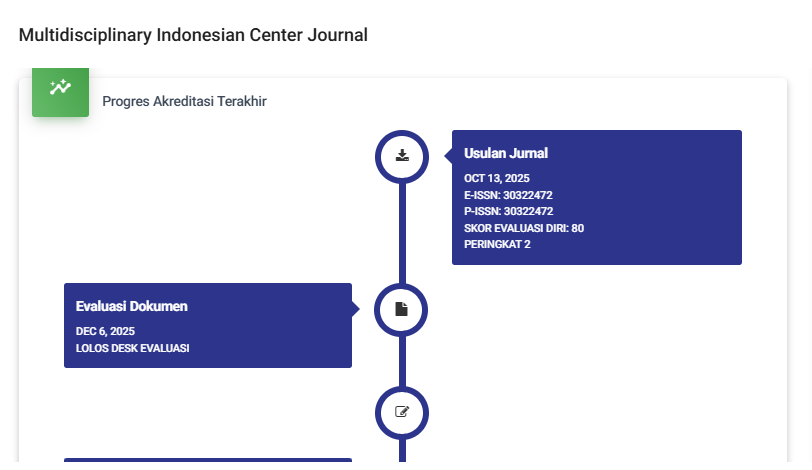PLATFORM-EMBEDDED ENFORCEMENT IN CRYPTOCURRENCY REGULATION: RETHINKING TAXATION AND ANTI-MONEY LAUNDERING IN INDONESIA’S CROSS-BORDER LEGAL CONTEXT
DOI:
https://doi.org/10.62567/micjo.v2i4.1251Keywords:
Platform-Embedded Enforcement, Anti-Money Laundering (AML), Cross-Border Law EnforcementAbstract
The rapid growth of cryptocurrency transactions presents both opportunities for innovation and risks of cross-border financial crime, including tax evasion and money laundering, which challenge the effectiveness of traditional regulation. This study aims to analyze the effectiveness of platform-based law enforcement particularly the implementation of the Travel Rule, CARF, and KYC in the Indonesian context. The research employs a qualitative multi-site case study method with data triangulation from international literature (FATF, OECD, IMF, Chainalysis, Cambridge) and national regulations (OJK, PPATK, DJP). The findings indicate that cryptocurrency platforms serve as key actors in detection and enforcement; however, their effectiveness is constrained by the sunrise problem, the migration of illicit activities into DeFi and OTC ecosystems, and legal sovereignty tensions arising from the dominance of global platforms. This study introduces the concept of Platform-Embedded Enforcement as a novel theoretical framework, integrating monitoring and enforcement mechanisms directly into platform architectures, thereby enabling compliance to be enforced automatically, in real time, and across jurisdictions. These findings contribute to the development of more adaptive, holistic, and effective cryptocurrency regulation in emerging markets.
Downloads
References
Kethineni, S., & Cao, Y. (2020). The Rise in Popularity of Cryptocurrency and Associated Criminal Activity. International Criminal Justice Review, 30, 325 - 344. https://doi.org/10.1177/1057567719827051
Carletti, R., Luo, X., & Adelopo, I. (2024). Understanding criminogenic features: case studies of cryptocurrencies-based financial crimes. Journal of Financial Crime. https://doi.org/10.1108/jfc-06-2024-0176
Leuprecht, C., Jenkins, C., & Hamilton, R. (2022). Virtual money laundering: policy implications of the proliferation in the illicit use of cryptocurrency. Journal of Financial Crime. https://doi.org/10.1108/jfc-07-2022-0161
Patsakis, C., Politou, E., Alepis, E., & Castro, J. (2023). Cashing out crypto: state of practice in ransom payments. International Journal of Information Security, 1-14. https://doi.org/10.1007/s10207-023-00766-z
Benson, V., Adamyk, B., Chinnaswamy, A., & Adamyk, O. (2024). Harmonising cryptocurrency regulation in Europe: opportunities for preventing illicit transactions. European Journal of Law and Economics, 1-25. https://doi.org/10.1007/s10657-024-09797-w
Nath, G. (2020). Cryptocurrency Crimes – Need for a Comprehensive Global Crypto Regulation. Social Science Research Network. https://doi.org/10.2139/ssrn.3683669
Uzougbo, N., Ikegwu, C., & Adewusi, A. (2024). International enforcement of cryptocurrency laws: Jurisdictional challenges and collaborative solutions. Magna Scientia Advanced Research and Reviews. https://doi.org/10.30574/msarr.2024.11.1.0075
Courtois, N., Gradon, K., & Schmeh, K. (2021). Crypto Currency Regulation and Law Enforcement Perspectives. ArXiv, abs/2109.01047.
Chen, X. (2024). Public Law Regulation and Joint Regulation of Cross-border Online Fraud: A Criminal Perspective. Lecture Notes in Education Psychology and Public Media. https://doi.org/10.54254/2753-7048/2024.bo17847
Galant, N., Himawan, M., Fitiriyanti, P., & Mahadianto, M. (2024). Tax Regulations On Cryptocurrency Transactions In Indonesia. Jurnal Ekonomi Teknologi dan Bisnis (JETBIS). https://doi.org/10.57185/jetbis.v3i6.113
Fajri, K., & Urumsah, D. (2024). Crypto laundering prevention in Indonesia: The role of regulatory technology and financial intelligence unit. Journal of Accounting and Investment. https://doi.org/10.18196/jai.v25i3.22170
Fajri, K., Faachrezzi, B., & Kurniawan, B. (2024). RegTech on Crypto FinTech: What Needs to be Done and Its Implications for the Anti-Money Laundering Mechanism. The International Journal of Financial Systems. https://doi.org/10.61459/ijfs.v2i2.75
Taniady, V., Permatasari, S., & Nugraha, R. (2022). Crypto Asset-Trade Resilience During The Covid-19 Pandemic In Indonesia. Jurnal Jurisprudence. https://doi.org/10.23917/jurisprudence.v11i1.13340
Rahayu, S. (2022). Implementation of Blockchain in Minimizing Tax Avoidance of Cryptocurrency Transaction in Indonesia. International Journal of Research and Applied Technology. https://doi.org/10.34010/injuratech.v2i1.6568
Galit, K., Djamchid, A., & Moti, Z. (2024). Fighting Fire with Fire: Combating Criminal Abuse of Cryptocurrency with a P2P Mindset. Information Systems Frontiers. https://doi.org/10.1007/s10796-024-10498-7
Paesano, F., & Siron, D. (2022). Working Paper 38: Cryptocurrencies in Asia and beyond: law, regulation and enforcement. Basel Institute on Governance Working Papers. https://doi.org/10.12685/bigwp.2022.38.1-69
Donnelly, S., Camacho, E., & Heidebrecht, S. (2023). Digital sovereignty as control: the regulation of digital finance in the European Union. Journal of European Public Policy, 31, 2226 - 2249. https://doi.org/10.1080/13501763.2023.2295520
Downloads
Published
How to Cite
Issue
Section
License
Copyright (c) 2025 Asyam Shobir Muyassar, Arief Fitrijanto, Jessika Nurhidayah

This work is licensed under a Creative Commons Attribution-ShareAlike 4.0 International License.



























